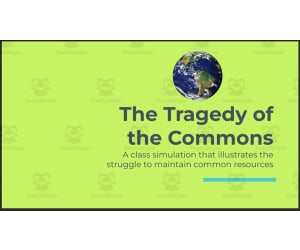2,818 products added recently
Psychology Games
Make learning about psychology engaging with games that explore human behavior and mental processes. This collection includes personality quizzes, memory challenges, and social dynamics simulations. By integrating these psychology games into your teaching, you can foster interest and understanding in psychological studies.
Abandon Ship! Titanic Social Stratification Game
Social Studies, History, Psychology, Grade 7, 8, 9, 10, 11, 12, Games, Activities
Abandon Ship! Titanic Social Stratification Game is an immersive role-playing activity where students decide which passengers get a spot in the limited lifeboats as the Titanic sinks. Students are split into groups and assigned character sheets with information about fictional passengers' identities and backgrounds. Each group must collaborate and decide which 5 of the 8 characters to "save" based on the limited information they are given about each person. This activity sparks thoughtful discussions around social stratification, privilege, discrimination, and more while also working on teamwork and decision-making skills. Most importantly, students find this activity highly engaging as they take on the roles of Titanic passengers fighting for survival. This versatile 25+ page teaching resource can be used as a standalone activity or supplement lessons on the Titanic, social stratification, ethics, discrimination, psychology and more for grades 7-12.
Author Ed Dynamic
Tags Social Stratification, Privilege, Ethics, Teamwork
Bullying Prevention Month Bingo, Anti Bullying Kindness SEL Game
Social Emotional Learning (SEL), Special Resources, Social Skills, Psychology, Social Studies, Kindergarten, Preschool, Games, Activities
Bring awareness, empathy, and kindness into your classroom with this Bullying Prevention Month Bingo Game. Designed as a fun and interactive activity, it helps students recognize positive behaviors, practice empathy, and build stronger classroom communities. Perfect for October’s Bullying Prevention Month or any time of year when teaching respect and kindness. What’s Included In this bullying prevention month bingo game pack? • 4o Unique Bingo cards with anti-bullying and kindness vocabulary • Calling cards for easy play • Bingo Marker • How to guide for easy understanding Why Teachers Love It: • Supports SEL (Social-Emotional Learning) in a fun way • Reinforces empathy, inclusion, and respect • Great for building classroom community • Engaging, interactive, and easy to use with no prep required Great For • Morning meetings and class discussions • Bullying Prevention Month activities • SEL lessons and character education • Small groups, centers, or whole-class play • Counseling or advisory sessions This Anti-Bullying Bingo Game makes teaching empathy and respect both fun and meaningful, while giving students the tools to stand up for kindness every day.
Author Perfect_Printables
Rating
Tags Bullying Prevention, Anti Bullying Game, Kindness Bingo, Sel Activities Kids, Bullying Awareness, Classroom Kindness Game, Respect Activities, Social Emotional Learning, Anti Bullying Month, Bullying Prevention Game
What Doesn't Belong? - AP Psychology Review Game
Social Studies, History, Psychology, Grade 10, 11, 12, Games, Activities
This resource is a What Doesn't Belong? - AP Psychology Review Game. There are 2 pages worth of terms related to Neuroscience. Words are grouped into fours. Students will analyze the words and determine which one doesn't belong in that group.
Author Skinner's Box
Tags Vocabulary, Terms, Psychology, Review Game, Which Word Doesn't Belong Worksheets, Which One Doesn't Belong Game For Adults, Which One Doesn't Belong Worksheet
The Tragedy of the Commons Simulation (Slides, Worksheet, Instructions)
Social Studies, History, Psychology, Grade 7, 8, 9, 10, 11, 12, Activities, Games
The Tragedy of the Commons Simulation introduces students to the economic concept of the "tragedy of the commons" through an engaging in-class game . Students compete in rounds to collect the most slips of paper, learning firsthand how self-interest can lead to overuse and depletion of shared resources. Accompanying slides explain the concept and connect it to real-world examples. This complete lesson includes teacher instructions outlining the lively simulation, student worksheets for reflection and discussion, printable slips for the game , and presentation slides summarizing key learnings. Applicable for middle and high school economics, social studies, or psychology, this hands-on group activity sparks critical thought on cooperation vs. competition and responsible use of shared resources.
Author Ed Dynamic
Tags Economics, Social Studies, Psychology, Cooperation, Competition
Personality: 64 SQUARES | Psychology Review Game
Social Studies, History, Psychology, Grade 10, 11, 12, Activities, Games
This resource is a Personality: 64 SQUARES Psychology Review Game. There are 64 questions, hence the name of the game. An answer key is included. Directions for how to play are included.
Author Skinner's Box
Tags Review Games, Social Studies, Personality, Theories, 64 Squares, 64 Squares






